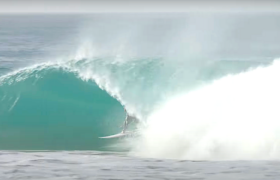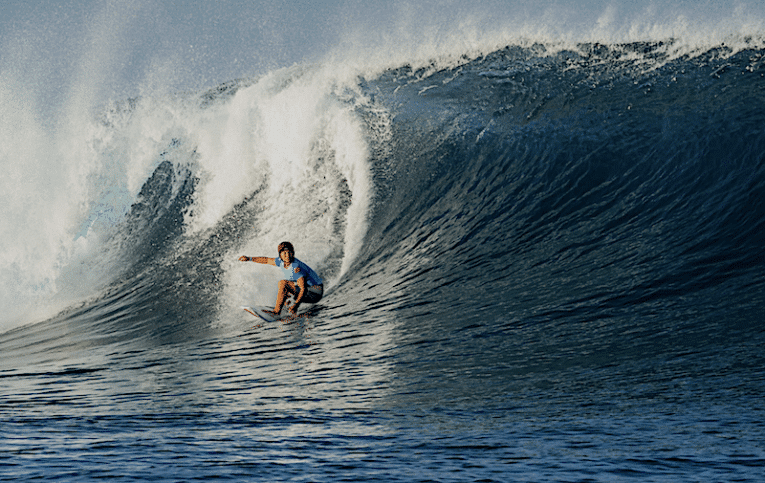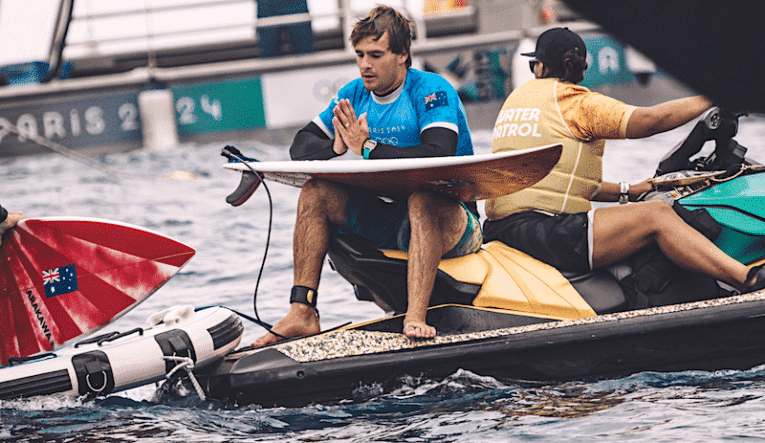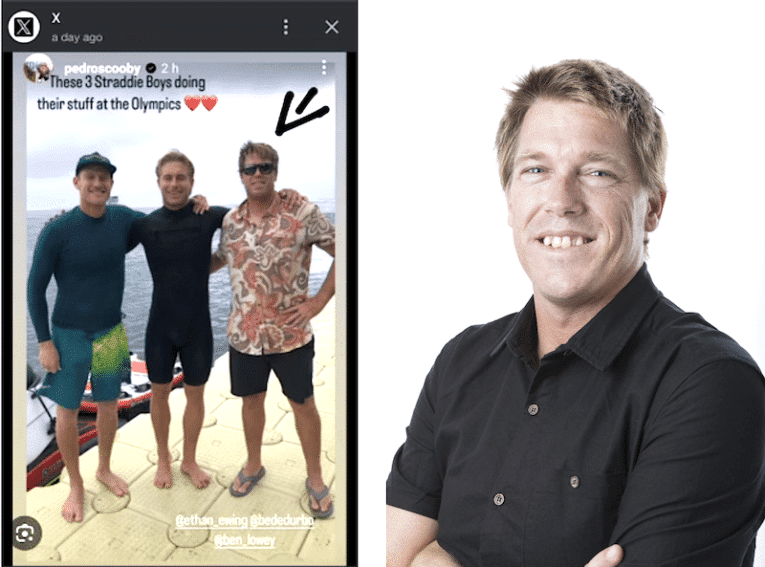"The ocean can be so cruel to surfing, and it exercised its full demonic forces on this Olympic event."
On Thursday as I watched the Olympic surfing event unfold, I couldn’t help but wonder, what we are even doing here?
In a marathon session, the event ran straight through quarterfinals in the most marginal surf imaginable. Small, lumpy, wind-fucked waves littered the lineup and low scoring heats dominated. It left me wondering if surfing belongs in the Olympics at all.
That was all the more evident against the backdrop of some of the other events unfolding at the same time. In gymnastics, Simone Biles won her second all-around gold medal with a landmark performance that showcased the peak of her astonishing powers. She faced a close, determined competitor in Brazil’s Rebeca Andrade, and together they pushed their sport to a mind-bending new level. In the pool, meanwhile, Katie Ledecki showed yet again why she is the best ever distance swimmer with a commanding victory in the 1500 meter.
Those events — and many others this past week — gave us the kinds of performances we come to the Olympics to see: The best in the world, doing the thing they were born to do, with all of the formidable powers at their command. World records fall and the sheer wonder of human ability stretches the imagination to the breaking point. If you have any love for sports at all, it’s impossible to look away, impossible not to feel something in the face of all this rare talent.
And then, there’s surfing.
It was hard not to feel a comedown yesterday and hard not to wonder how this grinding day of competition fit into the big picture of the Olympics. The ocean can be so cruel to surfing, and it exercised its full demonic forces on this Olympic event. Of course, contest surfers are accustomed to these kind of shenanigans, and prepare to deal with them.
But the whole thing felt deflating, all the more so, because we had a glimpse of what this event could have been. On Monday, beautiful, treacherous caverns turned Teahupo’o into a demented dreamland. Gabriel Medina delivered one of the peak moments of the event with his 9.90-point ride, that should by any estimation have been a ten.
As with life, beauty is so fleeting in surfing. It’s here today, and inevitably gone tomorrow.
If nothing else, this year’s Olympic surfing event has provided a painfully authentic vision of what surfing actually looks like. How many of us have shown up to the beach, hopeful and optimistic, only to find that the ocean had other ideas? We watch the forecasts, wax our favorite boards, and buy the best fins, only to have the ocean prank us again and again.
Recently, I was talking to a friend, who doesn’t surf. He’s interested in surfing, but has never actually done it. He asked me where I’d surfed the previous day. Ventura, I said. It wasn’t very good — cold and onshore, which is to say, a typical day in Ventura. Then why do it, he asked. I confess, I did not have a good answer to that question. Why do anything?
There is an absurdity to the whole endeavor of surfing that fits ill with the feel-good stories the Olympics invariably attempts to provide. When we paddle out, we are at the mercy of a force beyond our comprehension and well-outside of our control. We live moment to moment, our human agency puny against the forces the ocean brings to bear against us. It’s hard to assign any meaning at all to the whole thing.
Experience breeds skill, sure. Over time, we learn to read the signs a little more clearly. Still, more often than not, the ocean laughs at us. Surfing is the continual, delusional triumph of optimism over experience. We just keep going, when everything should be telling us to give it up, take up running, stay home and watch tv.
Both Biles and Ledecki have a clear advantage in this respect. The balance beam doesn’t suddenly run uphill. The high bar is always 250cm; the low bar is always 170cm. An Olympic swimming pool runs 50 meters in each direction, and Ledecki could likely swim a 1500m with her eyes closed. Almost certainly, she knows exactly how many strokes will carry her across that pool every time. A surfer can never know this feeling.
You’ll be thinking, well, surely this is an argument for wave pools — and maybe it is. How much of the Olympic surfing competition should be about reading the ocean? How much should be about the performance of riding waves? I’m not sure how to strike the balance here, but we’ve now had two Olympic cycles where the waves haven’t shown up. It is starting to feel like our weird pastime doesnt’t really fit in.
I could imagine a version of surfing that took a page out street skateboarding’s book. Move the whole burrito to a wave pool. Allow surfers two runs on the wave to score points with their favorite maneuvers — turns, airs, and whatever else they can invent. Then add a best trick element to force progression and open up space for surfers to show what they can really do. Score it all. Give out some medals. Go home smiling.
Of course, a contest like this looks nothing like how we normally define or experience surfing. It would become something altogether different. Torn from its roots in the ocean and its traditions, would surfing survive all these layers of artifice? Certainly, it would feel less relevant and less connected to the thing we go to the beach and try to do every day. Some of the magic would certainly be lost, and if the trade-offs add up to anything worthwhile.
By the end of Thursday, the medal contenders were decided. To be clear, all of them deserve to be there. They read the shifty conditions and made the most of their chances. They also got a little lucky, as is the always the case with heat surfing. We all need a little luck on our side out there.
When the contest resumes sometime this weekend, we’ll see four heats of semifinals and two medal-deciding heats. On the women’s side, Caroline Marks meets Johanne Defay, while Brisa Hennessy surfs against Tati West. On the men’s side, Kauli Vaast has Alonso Correa and Gabe Medina faces Jack Robinson. Forecasts suggest Sunday, the final day of the waiting period, could have decent surf. Do you feel lucky?
Before we move on, though, let’s pause a moment to give Carissa Moore her flowers. The defending Olympic champion lost to Johanne in the quarterfinals and tearfully confirmed her retirement from competitive surfing. The announcement should not come as a surprise to anyone, after Carissa left the Championship Tour earlier this year.
A five-time world champion, Carissa has consistently elevated her sport and continually given back to younger girls in the sport. Carissa’s a transformative character who’s given surfing so much. On Thursday, she showed a characteristic grace in her disappointment.
“I couldn’t have imagined a better place to finish off my career,” she said. “The process has been so much fun and I caught some waves I never thought I would’ve ever caught in my whole life. Don’t be afraid to go for it fearlessly and don’t be afraid to fail.”
Maybe there’s a little of that Olympic magic in surfing after all.










